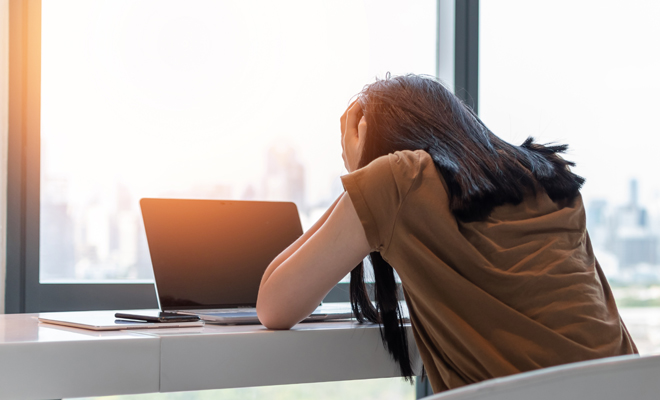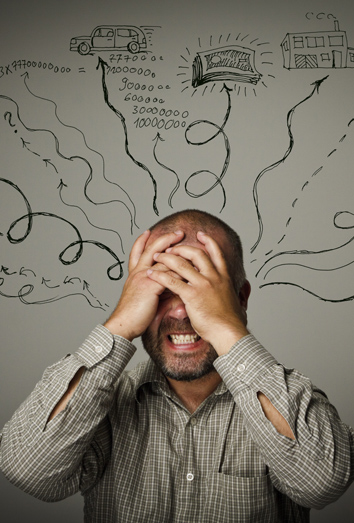Anxiety has become one of the main mental health problems today. And it seems that the hectic pace of life that we currently lead has begun to take its toll on our mental health.

In addition, with respect to its diagnosis, there are a series of difficulties that respond to the range of symptoms, which are similar to those of depression, and this can generate conflicts. When finding the type of treatment indicated for each particular person.
If you have experienced or know someone who is going through it, you know that it is a problem that can be truly annoying, and that if it is not treated in time, it can progress to affect all areas of life.
But don’t worry, there are several tricks that can help you calm anxiety and even help you avoid or get out of an anxiety crisis more quickly. Here we will understand a little more what anxiety is all about and we will provide you with some tips that will be useful to you.
What really is anxiety?
Anxiety itself is not bad, since it is an adaptive mechanism that allows us to know when we are in danger and seeks our homeostasis. The bad happens when it is present in your life for a long time or frequently.
For their part, anxiety attacks occur suddenly, and in them various symptoms are experienced that generate a lot of discomfort, and very high levels of fear that reach a maximum point in a short time.
What is experienced during a crisis?
The symptoms are very varied, and in each person they present themselves differently. Also, you should keep in mind that several of these symptoms can be felt together.
Among the symptoms that can be felt there are some physical and other psychological ones that can affect the daily life of those who present it. This includes sleep disturbances, headaches, overthinking everything, upset stomach, shortness of breath, high levels of irritability, tremors, among others.
During an anxiety attack, in addition to these exacerbated symptoms, sensations are often experienced that tend to be confused with heart attacks, with very strong chest pains and shortness of breath. It is a very unpleasant sensation that generates a lot of fear, especially the first time it is experienced.
Tips to calm the nerves in an anxiety crisis
At the time of having an anxiety attack, you feel a total loss of control. In many cases it feels as if you are having a heart attack, and this feeling of being able to die makes you feel very afraid and therefore more anxious.
The first time you experience an anxiety attack it is very confusing and frightening, because we do not know what is happening to us but it feels as if death is imminent. When you start to notice that anxiety is increasing and that your nerves are worse, try these tricks that will be of great help.
Pay attention to your breathing
Breathing is key to our well-being. However, when we suffer an anxiety attack, breathing becomes convulsed and generally begins, having the feeling that you are “lack of breath”.
So, one way to relieve nerves is to focus your attention on your breathing, trying to make it slower and more rhythmic. This can be difficult at first, but with practice you will become more easily.
Use your 5 senses
TO very is based on focusing attention on external stimuli, using the 5 senses, for this you must look around you and locate the following:
- 5 objects that you can see from where you are.
- 4 different sounds that you can hear.
- 3 things you can touch, it is not necessary to do so, but for some physical contact helps. You can also just be aware that it’s something you could touch.
- 2 odors that you can perceive.
- And lastly, one thing you might savor.
Ways to help someone having an anxiety attack
Living through an anxiety crisis is something very frustrating and can even generate a lot of fear, even when we are not the ones who are experiencing it. If someone around you is having an anxiety attack, the first thing to keep in mind is that telling the person to calm down during an anxiety attack is counterproductive.
When experiencing a crisis, it feels like you are completely losing control, we can even feel that we are going to die or that we will lose control completely and when we tell someone in this situation to calm down, it will only generate more pressure for them to try and realize that you can’t do it.
Faced with an anxiety crisis, do not tell someone to calm down. And then what can I do? In case this happens it is important that you remain calm. Breathe and apply:
Respect their space
It is quite common that when trying to calm someone down, our natural reaction is to try to hug someone who is feeling bad, but in cases of anxiety attacks this is not helpful. Respect his personal space from him, and if you are in a place with a lot of people, you can help him to go to another place that is calm and alone.
Remind him that you are here to help
It is important that you remind the person that they are not alone and that you are there to help them. Don’t take anything for granted; ask if there is anything you can do to help. If you’ve already had a panic attack, you probably know that it helps. Remember to always speak in a soft but firm tone of voice.
Breathing is important
Hyperventilating is very common when you have an, so regulating your breathing is a great help in relieving symptoms. You can ask him to slow down his breaths or tell him when to breathe in and out. Another method is to ask the person to try to breathe with you, at your pace.
The key is to focus attention on another stimulus
Bringing your mind to the present is the key to relieving anxiety, and the best way to do it, without focusing on the unpleasant symptoms you are experiencing, is to focus your attention on some external stimulus. This always helps ease crises.
We know that experiencing an anxiety attack is very distressing; if this happens to you or someone you know, seeks you can understand the root of the anxiety and learn how to manage the related symptoms. In addition, by doing so you can learn to recognize the symptoms and warning signs that indicate a possible crisis.






